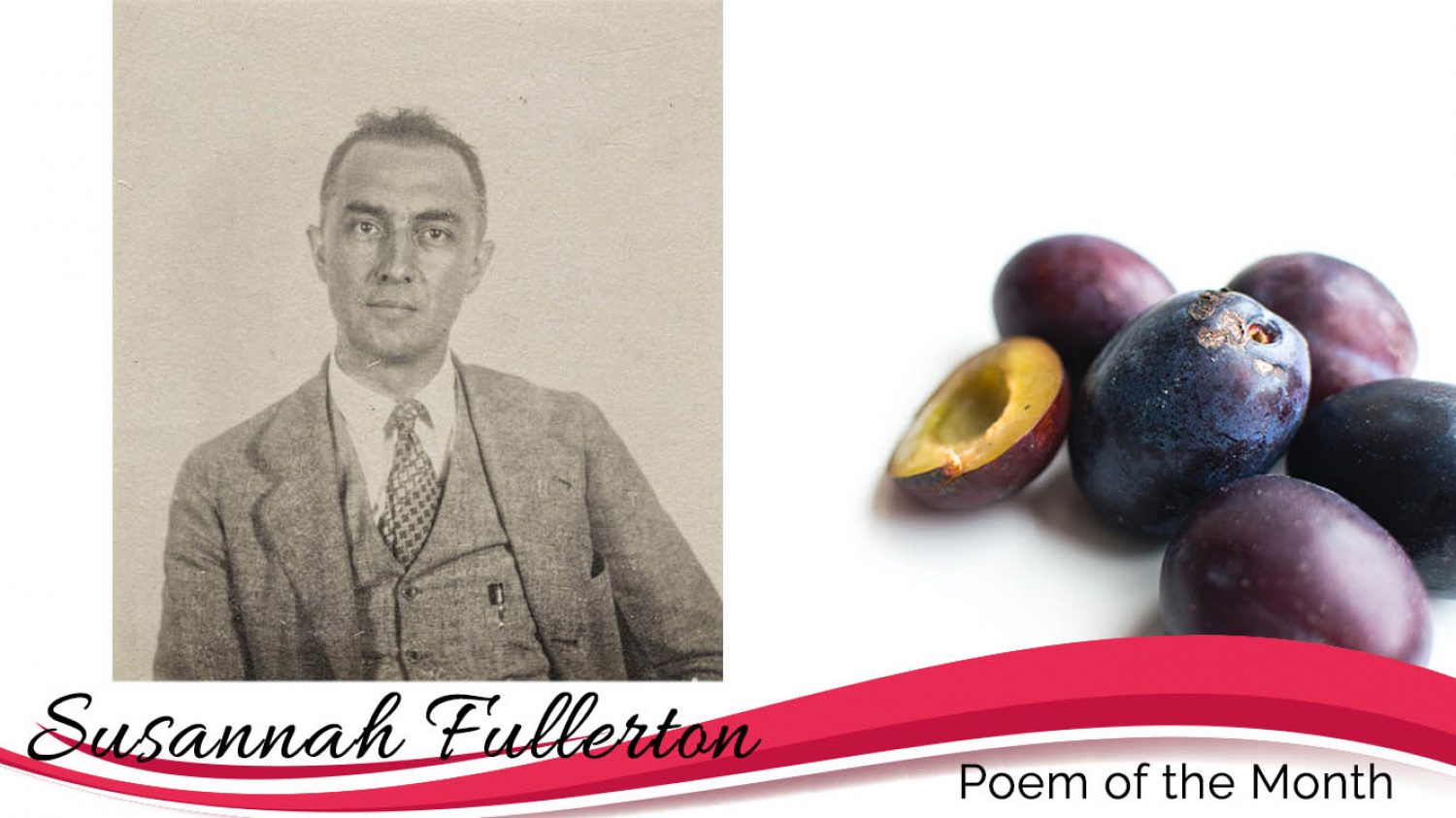American poet William Carlos Williams (1883 – 1963) was a paediatrician, and a poet who did much to promote the development of modern poetry in America. His poems are often deceptively simple, and his work frequently has an affinity with painting, in which he had a great interest. He once stated: “The purpose of an artist, whatever it is, is to take the life, whatever he sees, and to raise it up to an elevated position where it has dignity.”
His short poem This Is Just to Say was written as though it were a message attached to the door of the refrigerator, or left on a kitchen table.
I have eaten
the plums
that were in
the icebox
and which
you were probably
saving
for breakfast
Forgive me
they were delicious
so sweet
and so cold
The poem has no punctuation (and only two capital letters) and has no regularity of stress or syllable count, and is without rhyme. It’s really only typography that makes us know it is a poem.
Williams wanted to capture ordinary moments in everyday life in his poetry. It’s rooted in domestic reality, but it also leaves the reader wondering – were the plums supposed to be shared, is there anything left in that icebox, did he get into serious trouble for eating them all? It’s a tiny snapshot of a poem, enticing and leaving us yearning for more. Are the plums a metaphor for sexual activity, or for forgiveness, or for sin (as the apple so often is)? While intended for just one person, it’s a poem with universal appeal.
I find it a wonderfully sensual poem – one can taste the sweetness of the plums and feel their chill. The setting is so normal, and yet one is aware of the sincerity of the apology and the love he feels in writing it.
The poem appears inscribed on a wall in the Dutch city of The Hague.
You can listen to William Carlos Williams read it himself here:
Have you experienced more of William Carlos Williams’ work, or are you tempted to look him up now? Share your thoughts by leaving a comment.
Comments are moderated, and will not appear until approved.
[DISPLAY_ULTIMATE_PLUS]


Walid
Susannnah
This is my nickel’s worth of what the poem means.
It is clear that Williams was consciously writing a poem disguised
as a casual note. If it were otherwise, he would’ve said something like:
Sorry, honey, I ate all the plums because,etc.
Asking forgiveness in the poem is appropriate because, knowing with high
probability that she saved them for breakfast, he ate all the plums, sparing
her none. This of course is a measure of how irresistible the plums were!
Susannah Fullerton
Yes, I agree. He is asking forgiveness in a very beautiful way.
Pam Allen
I love this poem: the way it makes us speculate about what comes before and after it.
Susannah Fullerton
I so agree! It makes your imagination work, doesn’t it!
Camilla Hubbard
Since joining to receive your newsletters last year at a luncheon at Blaxland, NSW Australia, for the Lantern Club, I have enjoyed reading it very much. I clicked on “Selected Poems” after hearing it in the author’s own voice, and to my surprise the last item was my recently published book of Christian poems “Living & Learning – Poems of Purpose” (by Camilla Diann – my nom-de-plume.) I wonder if you may be interested in reading it, and if so, would you like me to post you one of the few Book Stubs, so you could download it free (for a single time). My poems have been written from the heart, and frequently speak to the hearts of others.
In Australia, it is not in bookstores – way too expensive for a poetry book – so I sell them myself for $20AU + $5 postage within Australia. All profit goes to a Presbyterian charity.
I personally prefer rhythm and rhyme, but I do see what you mean about this one. This is just to say, says it succinctly and the meaning is very clear and evocative.
Gail Shore
Sorry to say, I can’t see any literary merit in that little poem.
Susannah Fullerton
Poetry is a very individual thing, and I guess it all comes down to personal taste. I love the poem – I can so clearly see that kitchen, the note left there, feel the man’s guilt and sense how irresistable those chilled plums were.
Peter Rainey
Susannah
I got away with reading “The Red Wheelbarrow” at 3 school assemblies over the years. I might add that more students came up afterwards and wanted to talk about the poem than anything else I said!
You’ll know about Jim Jarmusch’s beautiful film “Paterson”… which pays great tribute to Williams, has a reading of “This is Just to Say”, and is really about “The Red Wheelbarrow”. I’ll send you the film review I wrote about it when we screened the film in town in 2018.
Regards
Peter Rainey
Susannah Fullerton
Thanks so much for emailing me the film handout, Peter. I read it with interest. I have never seen the film and it sounds fascinating. Thanks for letting me know that the Williams poems appears in the film ‘Paterson’. Great to have so much interesting information.